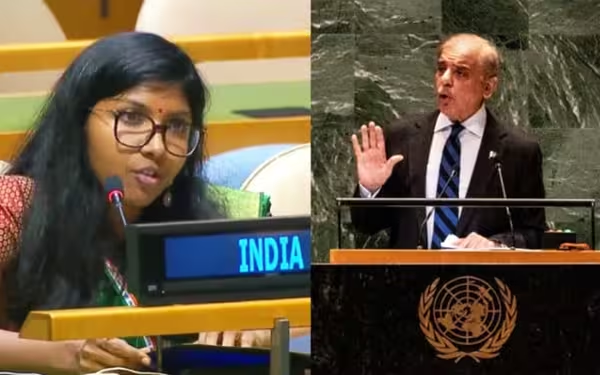Saturday, November 16, 2024 07:46 PM
UN Clash: Pakistan, India Delegates Dispute Over Kashmir and Terrorism
- Pakistan criticizes India's Kashmir policies at UN.
- India labels Kashmir an internal matter.
- Call for peaceful dialogue between Pakistan and India.
 Image Credits: tribune.com.pk
Image Credits: tribune.com.pkDelegates from Pakistan and India clash at the UN over Kashmir and terrorism allegations, highlighting the need for peaceful dialogue.
The ongoing conflict between Pakistan and India over the Kashmir region has been a long-standing issue that has drawn international attention for decades. The United Nations has often served as a platform for both nations to voice their concerns and grievances. Recently, this tension flared up once again during a session at the UN, where delegates from both countries engaged in a heated exchange regarding Kashmir and allegations of terrorism.
On Friday night, Pakistani Prime Minister Shehbaz Sharif took the floor to criticize India’s policies in the region of occupied Kashmir. He accused the Indian government of not only violating human rights but also of sponsoring terrorism against Pakistan. This statement was met with immediate backlash from the Indian delegation. Bhavika Mangalanandan, a first secretary at India’s UN Mission, responded sharply, labeling Kashmir as an "internal matter" of India and dismissing the accusations made by Pakistan.
The exchange highlights the deep-rooted animosity and differing narratives that both countries hold regarding Kashmir. For Pakistan, Kashmir is viewed as a disputed territory that requires international intervention, while India maintains that it is an integral part of its nation. This fundamental disagreement has led to numerous conflicts and has complicated diplomatic relations between the two countries.
As the situation continues to evolve, it is essential for the international community to remain engaged and encourage dialogue between Pakistan and India. Both nations have a responsibility to address their differences peacefully and work towards a resolution that respects the rights and aspirations of the people in Kashmir. The UN can play a crucial role in facilitating this dialogue, but it requires both sides to come to the table with a willingness to listen and compromise.
The clash at the UN serves as a reminder of the complexities surrounding the Kashmir issue and the need for constructive dialogue. While emotions run high, it is crucial for both Pakistan and India to seek common ground and prioritize peace over conflict. Only through understanding and cooperation can a lasting solution be achieved, benefiting not just the two nations but the entire region.













